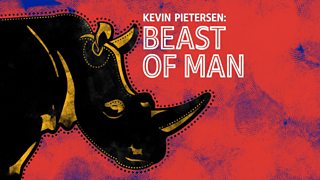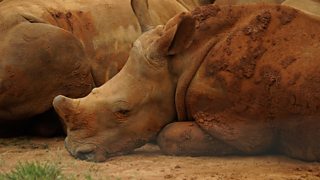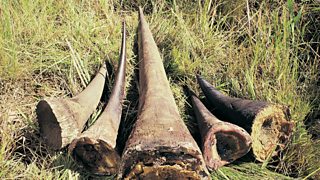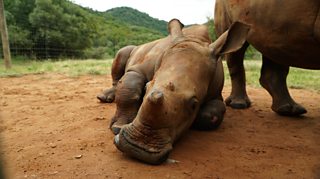Are rhinos trophy hunted?

Are rhinos trophy hunted? In short, yes. But that’s not the main reason rhino populations are so endangered. The majority of rhinos are killed through illegal poaching.
Trophy hunting is effectively the legal shooting of carefully selected animals in parts of Africa - including some species of rhino - under strict Government controls.
Clients from mainly Europe or America pay money - often thousands of pounds - to hunt the chosen animal and keep a ‘trophy’ from that hunt – usually the head or skin, or another body part.
Participants can then take their trophy home with them, once they’ve filled out all the appropriate forms.

Trophy hunting is an emotive and complex issue. Whilst critics describe it as a 'blood sport', and animals are killed, proponents say it helps raise vital money for conservation, especially with regard to endangered species. (For more on the pros and cons, .)
Conservation is not flying to South Africa and shooting a rhino"Kevin Pietersen
Kevin Pietersen is against the practice.
"They call themselves conservationists… conservation is not flying to South Africa and shooting a rhino, shooting a leopard, standing over a giraffe.
"If you’re going to come to Africa and you’re going to shoot an endangered species, because you want to fulfil this thrill of yours, I don’t get you."
What is its relevance to rhinos?

This is where it gets a bit confusing. Rhinos are on the ‘big five’ list that many trophy hunters like to achieve.
In South Africa – where our story is based – there are strict controls on hunting black rhinos, which are critically endangered. Only five trophy hunting export permits are issued for black rhinos each year.
Southern white rhinos are hunted without quotas, but according to a report by TRAFFIC and other organisations, the (around 0.34% of the overall white rhino population in South Africa and Namibia were trophy hunted in 2015).
So, trophy hunting does target individual rhinos in South Africa but, according to the Scientific Authority of South Africa, the legal international trade in the export of hunting trophies is ‘non-detrimental’ to the survival of white rhinos and should be allowed to continue.
And the numbers are small compared to the number of rhinos that are illegally poached each year in South Africa.
According to the Conservation Action Trust, in 2015, 22 southern white rhino were imported into the United States.
That’s compared to 1,175 rhinos that were poached in South Africa in the same year, as reported by the South Africa Department of Environmental Affairs.
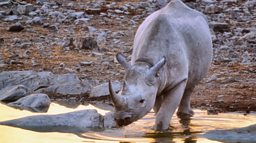
So let’s look at the arguments for how trophy hunting helps conserve animal populations.
Trophy hunting has played a key role in the recovery of the white rhino population"Save the Rhino International
Save the Rhino International says on its website: "Trophy hunting has played a key role in the recovery of the white rhino population in South Africa, and helped the species recover from the brink of extinction."
The charity says that since limited hunting was permitted in South Africa in 1968, "the number of southern white rhinos has increased from ".
Most white rhinos are hunted on private land. The money that comes in from trophy hunters is supposed to provide an incentive for these private landowners to continue to keep and protect rhinos.
There are also those that argue the money raised from trophy hunting goes back into the poorer communities that would be most vulnerable to poaching.
Critics argue this isn’t true, due to a mix of Government corruption and most of the money going to the richest few.
Watch: 'I'm "proud" to shoot animals'
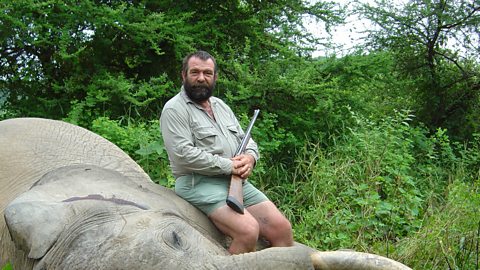
When Kevin Pietersen met a trophy hunter
David Barrett says he is "proud" to shoot animals like elephants, hyenas and buffaloes.
Proponents also point out that animals are carefully selected for trophy hunts.
Somebody鈥檚 got to shoot them, so it might as well be me"David Barrett, trophy hunter
So, in the case of the rhino, it might be a bull that is old, past breeding age, and is causing problems in, or has been rejected by, his herd.
For elephants, it might be that they are on the Problem Animal Control list.
David Barrett has killed PAC (problem animal control) animals, and met Kevin in the making of Beast Of Man.
"Problem Animal Control means the animals are coming into the crops, chasing villagers, endangering life," he said.
"Sooner or later, they’re going to kill somebody, or… they’ve got to be shot; somebody’s got to shoot them, so it might as well be me."
Comedian Ricky Gervais told 成人论坛 Radio 5 Live's Nihal Arthanayake: "This ridiculous thing that trophy hunting is conservation, it’s nonsense.
"We wouldn’t let someone shoot one cancer patient for a million pounds and then pay for the chemo for the others.
We wouldn鈥檛 let someone shoot one cancer patient for a million pounds and then pay for the chemo for the others"Ricky Gervais, comedian
"Why are we letting these people use bow and arrows to see what it’s like to smash a giraffe or a leopard’s head in and then take a picture on Instagram?"
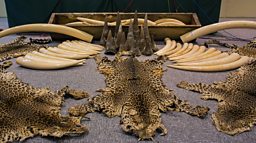
A cross-party Early Day Motion, signed by more than 159 MPs, is also calling on the UK government to stop trophy hunting imports of endangered species.
In 2018, more than 50 celebrities, including singers Ed Sheeran and Liam Gallagher, signed an open letter in support of the Campaign to Ban Trophy Hunting, urging the government to ban trophy hunters from importing body parts into Britain.
They urged the environment secretary Michael Gove to halt the import of tusks, skins and fur from what they called "cruel, immoral, archaic and unjustifiable" hunting.
Speaking to Kevin Pietersen, Mr Gove said the UK will not be banning imports from trophy hunting "yet", saying it was a "delicate political balancing act".
He said he had been advised by wildlife charities to "be cautious" in following other countries in outlawing imports from the controversial sport.
He said they told him: "Don't come in, you know, with your clod-hopping boots from the UK and necessarily tell people in each of these countries exactly how they should regulate their own wildlife."
A in March 2019 found 74 rare animal body parts - including 28 from elephants - were legally brought into the UK by hunters last year.
In Africa, opponents to trophy hunting also argue that you can’t kill the same animal twice.
They claim whilst a trophy hunt may raise a considerable amount of money, it only does so once, whereas a carefully protected rhino or lion can continue to raise money via ecotourism throughout its life.
Want to hear more? Download the podcast
-
![]()
Trailer: Kevin Pietersen: Beast Of Man
The rhino. An icon, all but extinct. A maverick who never backs down says he鈥檒l save them. It鈥檚 raw. It鈥檚 war.
